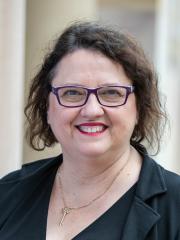
Lorelle Holland is a proud Mandandanji woman who grew up on Turrbal Country with her four sisters and parents. She is a dedicated and passionate Registered Nurse with over three decades of experience across clinical, management, education, and research roles in the health care sector. A highlight of her nursing career was working as a Remote Area Nurse in the Northern Territory, providing care alongside Aboriginal communities.
Lorelle currently holds the position of Senior Research Officer in Indigenous Health at the Poche Centre for Indigenous Health and the ARC Centre of Excellence for Indigenous Futures, and is an Affiliate at the School of Nursing, Midwifery and Social Work at The University of Queensland. She hopes to inspire the next generation of health equity researchers to enable thriving Indigenous futures.
A proud UQ alumna, Lorelle graduated with a Master of Public Health (Indigenous Health) in July 2020. Her proudest academic achievement to date was receiving the Postgraduate Coursework Academic Excellence Award, presented by Professor Bronwyn Fredericks (Pro-Vice-Chancellor, Indigenous Engagement) and Professor Tracey Bunda (Academic Director, Aboriginal and Torres Strait Islander Studies Unit).
Lorelle’s standpoint as an Aboriginal woman, combined with her extensive nursing experience and public health education, offers a broad and nuanced perspective on the complex interplay between environment, health systems, interdisciplinary collaboration, and the social determinants of health. She advocates for the decolonisation of health interventions, grounded in the United Nations Declaration on the Rights of Indigenous Peoples (UNDRIP), which affirms the rights of Indigenous peoples to lead transformative change through their own knowledges, strengths, and sovereignty.
Lorelle is currently undertaking PhD studies at the Child Health Research Centre within UQ’s Faculty of Health, Medicine and Behavioural Sciences. Her research explores critical race theory, child development and the complex health needs of Aboriginal and Torres Strait Islander youth disproportionately affected by detention and family separation during critical developmental periods. Her work is guided by transformative epistemologies and decolonising methodologies, centring youth and their communities in the co-design of culturally responsive, holistic assessment and diversionary pathways to counter youth detention practices.
